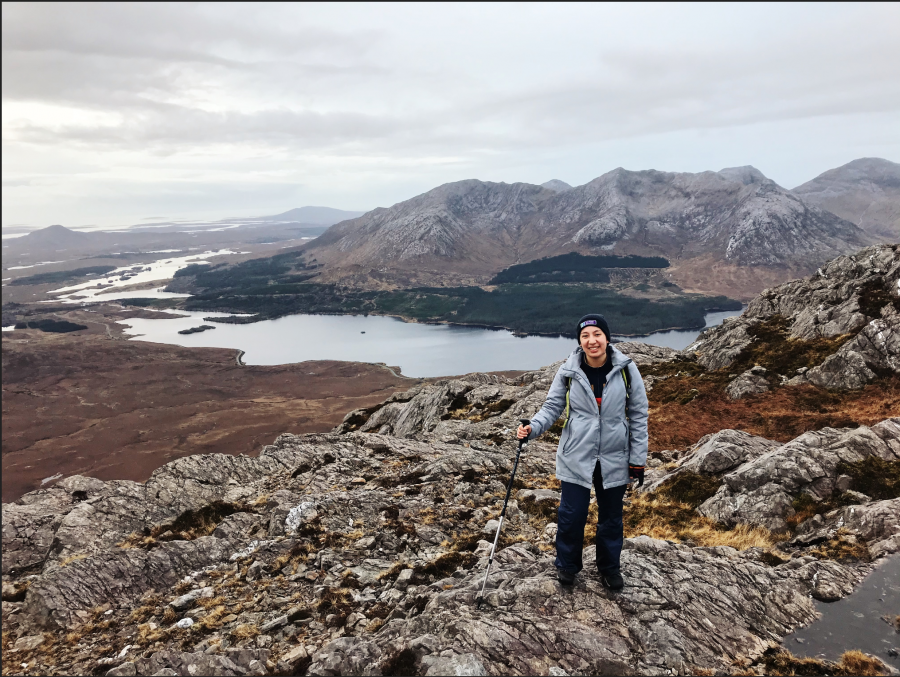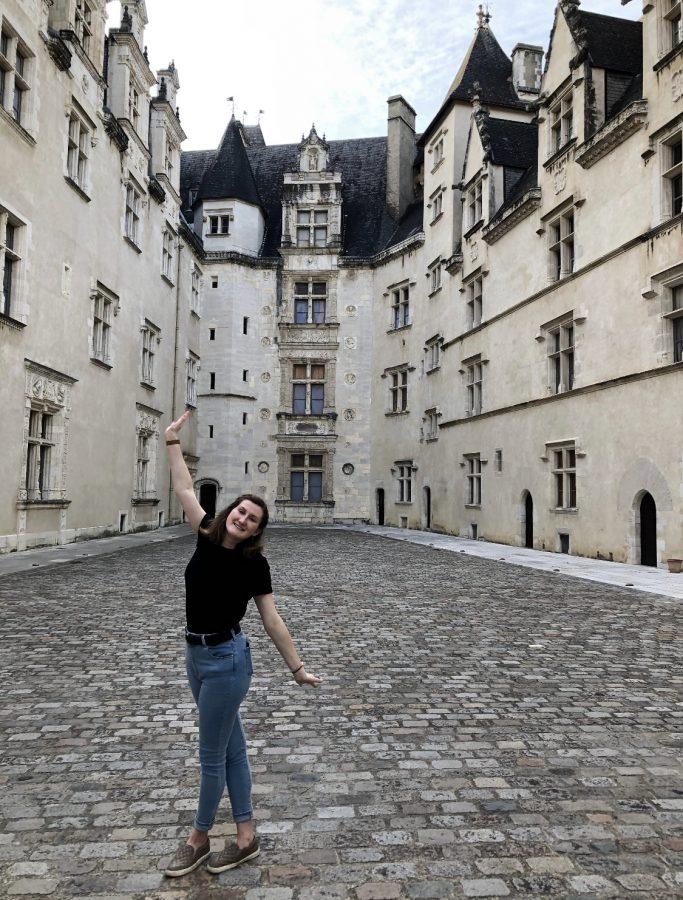Due to the outbreak of COVID-19, several study abroad programs had to be canceled and students who were already abroad were asked to return home.
Junior Morgan Lynch was in southern France, taking all French language classes at Universite de Pau, surrounded by mountains and palm trees.
“There’s this thing called ‘bise,’ which is like a greeting, so instead of shaking hands or hugging you kiss the person’s cheek on each side,” Lynch said. “Specifically in the Midwest, people are always really friendly and you can say hi to people on the street or smile at them, but in France you are crazy if you do that. People don’t make eye-contact on the street at all and are generally just kind of really cold.”
Lynch was the only Augustana student in the program and says it pushed her to get to know new people, which was fun for her. She said just as the virus started to become an issue in February, she and her friends had planned a trip to Italy and ended up canceling all of their flights and Airbnb reservations.
Instead, they chose to go to Portugal, where one of her friends was told by her school that she had to return home.
“That’s when it became real for us and we realized that eventually our program was going to end a lot quicker than we thought,” Lynch said.
Junior Siena Oliveri was also asked to return to the states from her study abroad trip in Galway, Ireland at National University of Ireland – Galway. She was taking four elective classes there.
Like Lynch, Oliveri did not go through an Augustana program.
“It was really wonderful and really challenging,” Oliveri said. “Just two Augie students went and I had to try to meet friends and people to travel with and hang out with. I had to create a whole new social circle.”
According to Oliveri, the lifestyle in Ireland is “less focused on stress or productivity or deadlines or perfection” and is extremely family-focused. On the weekends, many students would go home and all social gatherings would take place on weeknights.
In Ireland, she said that the situation with COVID-19 “got intense really quickly.”
Both Lynch and Oliveri said Augustana wasn’t quick to pull them back. But according to Oliveri, after the travel bans were placed, she was required to return to the United States before March 21.
“Augustana contacted me eventually. I thought they handled it really well,” Lynch said. “I think my program canceled before [Augustana], but it was pretty much the same time.”
According to Pedro Bidegaray, Director for the Office of International and Off-Campus Programs (IOP), the first program to be canceled was an anticipated trip to China. The student was supposed to go to Shanghai but was transferred to a program in Dublin instead.
The next program to be canceled, though hesitantly at first, was a program going to Korea.
Bidegaray said that as information was collected from the CDC and World Health Organization, they “became very alarmed” and canceled the trip immediately.
“You are reacting based on whatever you understand is risky or not,” Bidegaray said. “Thankfully, we have contacts with colleges and partners around the world and as I [was] working with Michigan State, or other universities like Grand Valley, it became very clear that it was becoming a consensus that some of those programs in Asia needed to be canceled.”
At that time, the number of infections in Europe wasn’t significant, Bidegaray said. But as the numbers grew, Bidegaray realized those programs had to be canceled as well, including sports teams that were about to go to Spain and Italy.
“We wanted to be cautious,” Bidegaray said. “We didn’t want to accelerate a process that we knew was irreversible. At the same time, we didn’t want to act in an alarmist way.”
Bidegaray says that seven or eight students had their trips canceled before departure. There were 13 students abroad, 12 of which returned to the states, and one who decided to stay.
Lynch’s program was supposed to go through April 30, but she returned home March 18.
“It was like a mad dash to get out of the country,” she said. “My flight and my train got canceled the first time [I tried to leave]. I had to get a new one really quickly. It was hard.”
Oliveri left Ireland on March 16, four days after the travel bans were placed.
“What was most stressful, it felt like, was the fact that all of the abroad students had all been traveling all over Europe,” Oliveri said. “Two weeks before I left I had been in Germany, and the week before I left I had been in Scotland. So having done that much travel while the virus was really escalating all over Europe, that just felt really stressful – everyone was just stressed about having the virus and going to all the airports.”
At the airport, Oliveri said, she had to do extra screenings as well as fill out a questionnaire about her health.
When she got home, Oliveri self-quarantined for 14 days where she spent most of her time in her room and eating on disposable dishes.
“It was definitely isolating,” Oliveri said, though she is relieved to be home and healthy.
Now both in the states, Lynch and Oliveri continue to learn through online classes conducted by their universities abroad.
For other students whose classes didn’t transfer over, there was a “great effort” by the registrar and financial aid offices as well as between professors and academic advisors to ensure students had alternative ways to earn their credits through internships and independent studies, according to Bidegaray.
“All the students were great,” Bidegaray said. “Nobody was complaining or blaming anybody and they all understood what was happening.”
Financially, Bidegaray says that the students who were going to study abroad have the option of moving their application fee to a different program next year, or are receiving refunds.
For students who were pulled from current study abroad programs, their tuition is still being used as they continue to learn online. However, in some cases they may be reimbursed for housing and meals.
According to Lynch, she is receiving a 20 percent refund from her program, as well as reimbursement for her flights up to $500.
All of the summer study abroad programs were also canceled.
Senior Kirsten Parr was supposed to go to Spain. There, she and her classmates were to embark on a pilgrimage on the Camino de Santiago.
She says it makes sense that college canceled due to concern over the virus, but it is disappointing.
In preparation for the trip, the class gathered on Tuesdays and Thursdays to learn about pilgrimages and the history of Camino in general, as well as prep meetings and hikes.
Despite its cancellation, the class still meets through distance learning so that students can earn credits and learning perspectives.
“All around, there’s major disappointment but we’re definitely leaning on each other,” Parr said.
Parr says that because of the hikes and the anticipation of going on a trip together, the class has grown close as friends and a kind of family.
“It’s good that we have each other, and I think that’s helping people get through it,” she said. “The school-sanctioned trip is canceled, but it’s not like the Camino won’t be there. We’re still receiving the information and the knowledge that we can take with us to do the Camino later in life – potentially – which I think is really awesome.”
Featured image: Junior Siena Oliveri stands on the Maumturk Mountains in Connemara National Park, Galway Co. during her study abroad trip to Ireland. Photo submitted by Siena Oliveri.











































































































